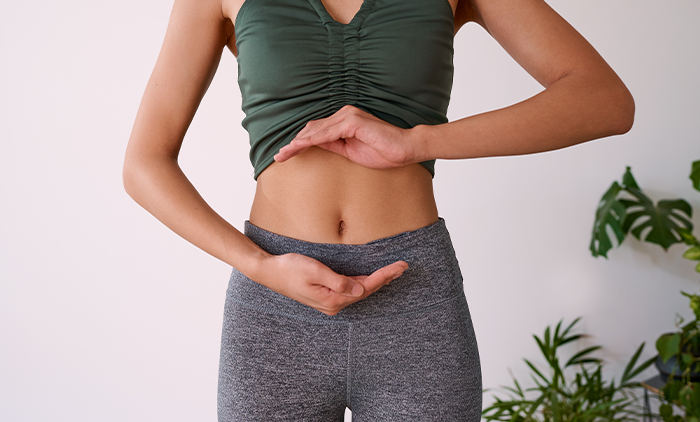Things you’ll learn in this blog: |
Stress can have a massive effect on our mental and physical health, and in extreme cases, it can cripple us and make getting through life far more challenging.
Most people will struggle with stressful periods from time to time, and in short bursts, it's not always a bad thing and can be used as a motivator.
That said, sometimes stress can get the better of us all and lead to sleepless nights, poor concentration and focus, and it can also affect our physical health, potentially leading to stomach and gut problems.
These contrasting effects make up the difference between good and bad stress. Good stress (such as achieving a challenging target at work) can make us stronger, while bad stress only weakens us.
Thankfully, many solutions exist to combat stress and reduce its effect on our bodies and mind.
Naturally, the best way to deal with stress is to eliminate the cause of it, but if that stress comes from work or family life, it can be hard to step away from it.
If this is the case, the next best thing is to try adding exercises to your daily routine.
Here's a look at the top five exercises you should try and information about why exercise can be so valuable for reducing stress in the first place.
How does exercise help with stress?
When stress levels start to build, exercise is a great relief and can help calm you down and alleviate the symptoms of extreme stress too.
This is all because exercise increases your body's natural production of a chemical called endorphins.
Endorphins are your natural stress-fighting chemical and are also known to help relieve pain and improve your general feeling of well-being. Exercise isn't the only activity that can increase endorphins, as eating, resting, and sexual intercourse can also release endorphins.
Still, cardiovascular-based exercise is arguably the best way to release these 'happy hormones.' Endorphins are why many runners and athletes say they feel a sense of euphoria when they finish and even during their exercise, which you can utilize to help reduce stress levels.
Of course, endorphins aren't the only factor in play that makes exercise great.
Exercise also helps shift your focus away from the stressful situation - it gives you something else to think about and releases built-up tension in the body.
When focused solely on the exercise and working hard to clear your mind as you go through the activities, you'll be giving yourself a break from the stressful situation in your life, allowing you to go back to the stressor with better clarity to resolve it.
Regular physical activity can also bring more balance into your life, giving you time and a break and allowing you to allocate some special time for yourself.
In addition, the physical benefits of regular exercise can also increase self-confidence and help to reduce feelings of anxiety or depression that can often accompany stress. It can make you feel much better about yourself, giving you the confidence and ability to tackle stressful situations from a healthier mental state.
Whether it's yoga or running, Pilates or kickboxing - make sure to prioritize some form of physical activity for stress relief, even if it's just 30 minutes daily.
Other mental benefits of exercise
Exercise isn't just great for busting stress. It can also help improve other aspects of your mental health too. This can help you in different areas of your life to make you healthier in general, and it can also influence your stress levels and how stress affects you. Some other benefits of exercise include:
1. Better sleep
Sleep is one of the essential aspects that leads to a healthy mind. When you sleep, your body goes into recovery mode, allowing your body to heal and your brain to take a break and process the day before.
Exercise can be a great well to help you get better sleep, simply because it exhausts you and should make you feel more tired as bedtime approaches.
That said, you may be more alert and awake immediately after exercise. This is because your blood is pumping at a faster rate.
This can help you feel less tired during the day, making it easier to fall asleep at night. When getting a total of eight hours a night, you'll notice that you'll typically be in a much better mood and will not be affected by stressful situations as much, helping you deal with these complex parts of life.
2. Improved energy levels
Exercise can also help to boost energy levels. This can be great if you suffer from fatigue or low energy levels, leaving you unmotivated to tackle your stressors head-on.
As mentioned in the previous point, increased blood flow and oxygen intake when exercising can help you feel more alert and awake. 
On a more scientific level, when you exercise, your body is spurred on to make more mitochondria, an essential chemical in your cells that breaks down glucose from your food into fuel.
This means having more mitochondria can improve your energy levels and overall stamina. As well as this, regular exercise can help to prevent energy dips throughout the day, so you'll always have the energy you need to get through your day.
This can help you better deal with stress; you may not feel overwhelmed and are more equipped to handle it.
3. Better concentration and focus
Finally, exercise has also been shown to improve concentration and focus. Exercising can help increase your attention span and improve your cognitive function if you have trouble concentrating or focusing on tasks.
Additionally, regular exercise has been shown to improve memory function. This is again down to releasing dopamine and other chemicals like serotonin and norepinephrine. These all affect our focus and attention levels, helping us to put our brainpower to use better and can help us deal with stressful situations from a higher level of cognition.
Exercise also increases the rate of blood flow to the brain. This sets off more neurons in your brain, which promotes cell growth, especially in the hippocampus, the brain area associated with memory and focus.
Top 5 exercises to reduce stress
Most exercises are great at relieving stress and making you feel better about difficult situations, so finding the right activity for you is all down to your preference and what you enjoy and feel accomplished in.
That said, if you're starting from a clean slate and want to incorporate some of the better exercises to help you tackle stress, then the following are the ones you should consider the most.
Generally, heavy cardiovascular exercises will help you release the most dopamine into your body, so you should focus on activities that get you breathing heavily.
Alternatively, some calmer exercises focusing on controlled breathing can also help relieve stress, forcing you to concentrate on the exercise and movements to get the best out of it. Trying any or all of the following to see how it improves your stress levels.
1. Running

Running is a great way to reduce stress, as it is one of the best ways to boost your body's endorphins, helping to make you feel much happier. Additionally, running can help to clear your mind and give you time to think about things other than whatever is causing you stress.
What makes running a good exercise is that most people can do it, regardless of their fitness levels. You don't have to run fast or for long distances at a time; just doing an amount that fatigues you is enough to feel the mental benefit.
In addition, running is an excellent exercise for tracking progress, as it's easy to measure distance or speed over time. That can help you achieve a feeling of progress, which boosts your mood and makes you feel better about your achievements, which allows you to tackle stress.
If you don't feel you're capable of long-distance running, you can also try interval jogging, where you run for a short time and then recover as you walk for a minute or two before running for another short burst.
Alternatively, going for a fast-paced walk, especially in a beautiful and stimulating area such as a park, can give you similar benefits.
[h3]2. Yoga
Yoga is another excellent way to reduce stress, as it helps to promote relaxation and mindfulness.
Mindfulness is about being present in the moment and focusing on your breath. This can help to center you and make you feel calmer and more relaxed.
Yoga is all about being in control of both your movements and breathing. Practicing some yoga poses and getting better at slow, deliberate breathing can help you relieve stress and appreciate a slower pace of life that can sometimes feel impossible when under stress.
Don't think that yoga isn't exhausting, though. The movements and poses, especially as you progress, can become challenging and takes a lot of work and effort, helping you produce those all-important endorphins that can tackle stress.
3. Tai Chi
Tai Chi may sound like an unusual and unconventional exercise for stress relief, but it's actually been found to be great at busting stress. The discipline is Chinese martial art involving slow, graceful movements, similar to yoga.
Tai Chi is effective in reducing stress, anxiety, and depression. Additionally, Tai Chi can help improve balance and coordination, as it strengthens your core muscles and vital muscles in your legs. If you want to boost mobility while reducing stress, this martial art is a great option.
If you want to try something similar but more conventional, boxing or kickboxing can also be a great way to combat stress.
Not only are the movements very cardio-intensive, but striking the punching bags and pads can also be a stress-relieving activity, as you'll be able to let out any pent-up aggression and anger in a healthy way that you may have built because of stress.
4. Weightlifting
Weightlifting is a great way to reduce stress, as it releases endorphins and helps to improve self-esteem.
Depending on the size of the weights used, the resistance put on your muscles helps elicit an increase in many essential hormones and chemicals, which can boost your mood and make you feel more fulfilled.
In addition, overcoming the challenge of lifting weights and sometimes completing complex sets can make you feel more assured and motivated, which helps tackle stress.
Plus, when completing multiple reps with smaller weights, the exercise becomes more aerobic and cardiovascular, helping you to release endorphins that combat stress.
In addition, continued weight training can help improve your physical appearance, which can help increase your confidence and self-belief, which can help you better tackle stressful situations, as you'll feel more capable of overcoming them. Also, the increased bone density and overall improvement in health is a great reasons for trying weightlifting.
5. Swimming
If you want exercise that's positive for your mind and easy on your joints, then lane swimming is a compelling option. As you're suspended in water, there's less pressure on your knees and other vital joints, making it a more pain-free exercise.
Swimming is very cardio-heavy, making it a great way to release endorphins, improving your overall levels of stress and well-being. In addition to that, swimming can also help you feel fresher and more alert, allowing you to tackle the day with more gusto and vigor.
Beat stress with exercise
Everyone will have to deal with stressful situations, it's a fact of life, but it doesn't mean you have to feel beaten and overcome. If stress is getting you down and making it harder to achieve your goals and affecting your mood, then exercising can be a great way to overcome it.
Exercise releases various chemicals in your brain, such as endorphins, which help to repress stress and make you feel better. Exercise can give you the clarity and ability to better deal with stressful situations, making you more equipped to deal with them without being as affected.
The five exercises mentioned here are great places to start if you want to use exercise to deal with stress but feel free to try your own activities to find an exercise that's right for you. Just 30 minutes a day can go a long way in making you feel better and overcoming stress's physical and mental effects.
Check out some of the other exercise articles to help you get movement into your routine:



